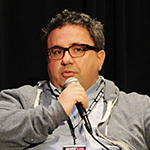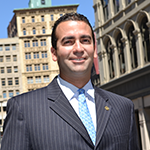
Duncan Alvarez isn’t afraid to change worlds. Change is the only constant in the business world and Alvarez, ExxonMobil’s treasurer for Qatar, Iraq and UAE, wouldn’t have it any other way. “One of the things I like about my job is the absence of predictability and repetitiveness,” says Alvarez, who helps manage the world’s largest integrated oil company’s finances—with more than $450 billion in yearly sales. “It’s not like an operational-type job where you’re cutting the same cookies everyday.”
Personally and professionally, Alvarez has bypassed the obvious. With firm family ties in Uruguay, not only having been born and raised in Montevideo, but also as a direct descendant of Julián Alvarez, one of the country’s founding fathers and former president of its Supreme Court, Alvarez uprooted himself from the familiar when a unique opportunity presented itself—a commercial banking job in Miami. But, there was a hitch: Alvarez knew nothing about banking.
At the age of 27, Alvarez had already received a degree in industrial and mechanical engineering from Universidad de la República—the equivalent of a master’s in engineering in the United States. Alvarez decided to accept an offer to work for International Finance Bank and leave the country simply because it was different.
“Commercial banking is not so difficult,” he says, “with my engineering degree I had all the necessary tools to be able to learn quickly and apply myself to learning banking.” His engineering degree supplied Alvarez with bundles of knowledge on quantitative analysis in mathematics—he simply needed to learn how to apply that ability to the finance world. So Alvarez enrolled in night classes at the American Institute of Banking, where he earned a diploma in international banking. Serendipitously, he also met his future wife through these classes.
After three years with International Finance Bank, a bank owned by the Ignacio Fierro Group from Spain, Alvarez fully embraced his new career path in finance by enrolling at the Wharton School of the University of Pennsylvania. Within two years, he had received his MBA in finance in 1998 and was offered a position at what
was then Mobil’s treasury department in Fairfax, Virginia.
Duncan’s Aha Moment
Tell us about the moment when you had a clear realization of what your direction should be (either personal or professional).
I have two. First, when I decided to leave Montevideo to work in a commercial bank in Miami. I was 27. Uruguay is a relatively conservative country so none of my friends left to live abroad. I thought “I have nothing to lose.” Second, when I decided to pursue my finance MBA. My wife and I were just married. Somehow we both knew it was now or never.
“The combination of the engineering and finance disciplines allows one to view the business world in a different way—you get to blend the rational world of engineering with the practical world of finance and investment,” Alvarez says. This integrated vantage point led to Alvarez’s hiring and subsequent success with the company. Within the first eight months as a financial analyst, Alvarez dealt with capital structure analyses and cost of capital issues along with arranging financing for a $66 million project in Texas. Frequently, Alvarez’s tasks involved marrying diverse sources of funding and disparate groups—like when he took an assignment in Mobil’s Project Finance Group in 1999 that involved export credit agencies in six countries, various commercial banks, and the bonds for projects that nearly totaled $8 billion.
In the same year, after the merger of Exxon and Mobil, Alvarez worked in the financial planning and analysis group in Dallas—assisting the treasurer with financial reviews, before joining the Affiliate Finance group where he determined optimal finance methods for diverse international affiliates and also solved issues related to international tax issues. Alvarez moved on to ExxonMobil’s Coal and Mineral Company in Houston where he participated in various billion-dollar initiatives to reduce assets in Chile and Colombia. Then, he moved on as a financial adviser of more billion-dollar projects in places like Kazakhstan and Russia before becoming global financial manager in 2006 for the polypropylene global business unit.
Beginning in 2009, Alvarez and his family relocated to the Middle East in order to manage ExxonMobil’s financial matters in the area. Noting there are a lot of similarities between Arab and Latino culture, Alvarez explains, “Latino culture has helped me understand other cultures and my ability to interact well with others.” That understanding of others planted itself into Alvarez from an early age.
Born and raised in Montevideo, Alvarez lived in Cuba and Colombia, between the ages of two and five, so travel was ingrained in him at a young age. Moreover, Alvarez’s father worked for the United Nations Development Program and would have to travel to countries such as Bolivia, Benin, Mexico, and Brazil. This allowed Alvarez the ability to travel with his family during summer vacation to distinct locales regularly, preparing him for different
cultures and breeding a love for liveliness and discovery.
The Ticker
What do you see as the future of the financial landscape in your industry?
On the future financial landscape of the oil and gas industry I can only speak for my company—we promote objectives that help meet the growing global demand for energy which we see as 35 percent higher in 2040 compared to 2010. The International Energy Agency estimates that global energy infrastructure investment needs to average $1.6 trillion per year through 2035. There are not many companies or governments that can easily finance these projects.
—Duncan Alvarez
“My workday is not monotonous—at all,” Alvarez says. “Something unpredictable is waiting for me every single day.” And Alvarez likes it that way. This love of the unknown, the uncovering of new problems leading to new solutions enticed Alvarez away from the world of engineering to the world of business and finance—and keeps him coming back to work. And like Alvarez’s formative summer vacations with his family, Alvarez brings his daughter, two sons, and wife around the world with him.
“Without a family, you seem a little bit incomplete,” Alvarez says. “Having a family with you all around the world is better than having to commute, but more importantly for the children, having the ability to live outside of the United States and see the rest of the world is important.” And while the Alvarez family consider Houston their home base, they are comfortable all around the world. In fact, Alvarez’s wife hails from Peru, but grew up in Canada—adding yet another diverse worldview to the children’s upbringing.
Alvarez’s father used to say, “Good luck only helps a good player,” and Alvarez heeds this. ExxonMobil is one of four AAA-rated businesses that still exist and is the world’s third-largest company with more than $450 billion in revenue. Alvarez gets to discuss investment decisions in the range of billions of dollars in a field that is constantly expanding and changing. Some would consider Alvarez to be lucky. He is—but only because, in the business field, he’s a good player. And in any world, he would find his prospects rich.

